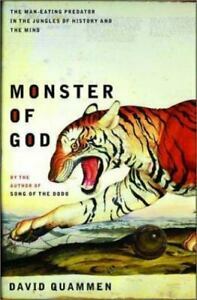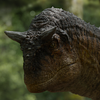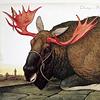You need to sign in or sign up before continuing.
Take a photo of a barcode or cover
34 reviews for:
Monster of God: The Man-Eating Predator in the Jungles of History and the Mind
David Quammen
34 reviews for:
Monster of God: The Man-Eating Predator in the Jungles of History and the Mind
David Quammen
informative
reflective
medium-paced
An interesting if meandering read. I went into it expecting the focus being on alpha predators, their biology/ecology/history/etc., but that felt very secondary to the human aspect. Absolutely worth a read, but expect a lot of history and politics built in. Also reading this 20 years on from its publication gives it a bittersweet edge, as in many ways the situation for these animals and the people living with them have gotten worse.
This was the first book I read by David Quammen, an author I've come to respect for all the outdoorsy articles he's written.
This book has nothing to do with monsters or God, the title looks like a ham-handed job by the publishers. It is something of an anthropological take on societies living in close proximity with large predators. Along the way, it also deals with a little science and ecology of these large predators.
Quammen tours quite a bit of the world, spending time in India with lions, crocs in Australia, brown bears in Romania, and ending the trip with Russian Amur tigers. But through out the book, more than the animals themselves, we have Quammen's interactions with indigenous peoples who've spent centuries with these predators, such as the Maldhari tribesmen: buffalo herdsmen who co-exist with lions in Gir National Park in western India.
The sections on Romania and the Russian far-east also deal with quite a bit of recent history of these troubled regions. Quammen does a nice job weaving history, mythology and ecology with a good dose of healthy speculation that makes a gripping read.
Throughout the book, Quammen makes a case for conservation of these species, marshalling evidence from ecological principles to plain sense-o-wunda. I was hooked from page one, although I might be biased since this book covered areas that I especially love reading about. Recommended but with caveats.
This book has nothing to do with monsters or God, the title looks like a ham-handed job by the publishers. It is something of an anthropological take on societies living in close proximity with large predators. Along the way, it also deals with a little science and ecology of these large predators.
Quammen tours quite a bit of the world, spending time in India with lions, crocs in Australia, brown bears in Romania, and ending the trip with Russian Amur tigers. But through out the book, more than the animals themselves, we have Quammen's interactions with indigenous peoples who've spent centuries with these predators, such as the Maldhari tribesmen: buffalo herdsmen who co-exist with lions in Gir National Park in western India.
The sections on Romania and the Russian far-east also deal with quite a bit of recent history of these troubled regions. Quammen does a nice job weaving history, mythology and ecology with a good dose of healthy speculation that makes a gripping read.
Throughout the book, Quammen makes a case for conservation of these species, marshalling evidence from ecological principles to plain sense-o-wunda. I was hooked from page one, although I might be biased since this book covered areas that I especially love reading about. Recommended but with caveats.
adventurous
informative
reflective
medium-paced
challenging
informative
slow-paced
Eh. This book wasn't really what I was hoping for. It's not so much about the predators and far more about the people. To be honest, I skimmed through a lot of it, although there were some parts that were interesting!
Although I realise it was written 20 years ago, I must comment on how the author seems to be against eco-tourism. He keeps talking about how hunting is essential to the survival of big predators as this gives them monetary value but neglects to talk about how people wanting to see these animals in their natural habitat can bring in money (although I do think that in some cases hunting may be necessary for other reasons - to keep populations within a carrying capacity!)
I'm sure this book is enjoyable for other people, but I feel like I wasn't really the target audience. I can tell a lot of work went into this, but unfortunately, it's just not for me.
Although I realise it was written 20 years ago, I must comment on how the author seems to be against eco-tourism. He keeps talking about how hunting is essential to the survival of big predators as this gives them monetary value but neglects to talk about how people wanting to see these animals in their natural habitat can bring in money (although I do think that in some cases hunting may be necessary for other reasons - to keep populations within a carrying capacity!)
I'm sure this book is enjoyable for other people, but I feel like I wasn't really the target audience. I can tell a lot of work went into this, but unfortunately, it's just not for me.
Moderate: Animal cruelty, Animal death, Child death
Met this author at a speaking engagement and book signing at the University of Idaho.
challenging
hopeful
informative
inspiring
reflective
sad
tense
slow-paced
A very solid take on the fragile relationship between large predators and humans throughout the world.
Full review at: https://skybookcorner.blogspot.com/2023/02/book-review-monster-of-god-by-david.html
Full review at: https://skybookcorner.blogspot.com/2023/02/book-review-monster-of-god-by-david.html
Moderate: Animal cruelty, Animal death, Child death, Racial slurs
"Great and terrible flesh-eating beasts have always shared landscape with humans." From the first sentence, David Quammen begins weaving a tale of interdependency, fear, adoration and conflict between Homo sapiens and apex predators throughout human history. As he travels from around the world meeting village elders, conservationists, hunters and laymen, Quammen addresses the convoluted factors that have previously, and continue, to plague our existence alongside the top predators in the world - predators that occasionally see us as simply another delicacy on the menu. Masterfully walking a thin, delicate line, he delivers first-hand accounts, mythological excerpts and academic research in an engaging, comedic voice while allowing readers to develop their own conclusions concerning conservation efforts and the future of his featured species: Asiatic lions, crocodiles, brown bears, and tigers.
I’m not sure what I expected of this book. It certainly wasn’t the detailed forays into Beowulf and the historical leaps away from man-eaters into Aboriginal history. However, Quammen adds them up all very well into a convincing and fascinating story. I enjoyed the cultural explorations of each section as much as I enjoyed the literary forays and scientific asides. Very interesting and nice read.
Whether through an error in my judgement or misleading advertising, this book wasn't quite what I thought it was going to be. I was expecting an exploration of the role and symbolism of alpha predators in religion, mythology and culture throughout history - certainly to me that is what the title implies. And the early chapters seemed to promise this, discussing the frequent references to lions in the Bible, the sacred roles given to bulls, crocodiles, lions in Egyptian hieroglyphs, shark worship on Pacific islands. But other than this all too brief exploration, with an occasional asides to discuss the Biblical Leviathan, Beowulf's Grendel, Humbaba in the Epic of Gilgamesh and, curiously, the alien in the Alien series, the rest of this book is devoted to exploring the relationship between a handful of native cultures and the alpha predators they share a landscape with.
So whilst I was disappointed this book wasn't what I'd been hoping for, I thoroughly enjoyed it nonetheless. Quammen is an engaging writer and I enjoyed his recounting of his own adventures tracking Australian saltwater crocodiles, Indian lions, Romanian bears and Siberian tigers just as much as I enjoyed the insights into the cultures that exist alongside these predators. Mainstream urbanised humanity has become all too detached from the ecosystems of which we are a part - how many of us, after all, think of ourselves as being part of the food-chain? In the pyramid of alpha predators, by and large Man is most firmly at the top. But remove our technological advantages, remove our guns and our vehicles and our scientific understanding, put us alone and on foot in a predator's territory, and our pretensions to Alpha status prove all too hollow. We become Prey.
However, as Quammen investigates, the cultures and societies that live most closely alongside alpha predators often develop a respect and an accommodation for them, despite frequently competing with them for food and territory or clashing over livestock depredations. The biggest threat to these creatures is not the individuals who live in closest proximity to them, but the voracious consumption of resources by the increasing encroachment of civilisation. The last few pockets of territory in which these creatures, lions and tigers and bear (oh my!), can live wild and free is rapidly shrinking. And another concern, as Quammen points out, is that those native culture may vanish right along with them.
So a good book, but not the book I was hoping to read. If you're looking for an in-depth investigation of the deep-rooted fear of alpha predators in the human psyche or an exploration of how these fears have been expressed through the millennia via religion, literature and art, you'll enjoy this book certainly but it won't quite be the book you're looking for. Too much of the present and not enough of the past for me. I'm glad I read it, and I'm sure I'll read more of David Quammen's work, but for now I'll keep looking.
So whilst I was disappointed this book wasn't what I'd been hoping for, I thoroughly enjoyed it nonetheless. Quammen is an engaging writer and I enjoyed his recounting of his own adventures tracking Australian saltwater crocodiles, Indian lions, Romanian bears and Siberian tigers just as much as I enjoyed the insights into the cultures that exist alongside these predators. Mainstream urbanised humanity has become all too detached from the ecosystems of which we are a part - how many of us, after all, think of ourselves as being part of the food-chain? In the pyramid of alpha predators, by and large Man is most firmly at the top. But remove our technological advantages, remove our guns and our vehicles and our scientific understanding, put us alone and on foot in a predator's territory, and our pretensions to Alpha status prove all too hollow. We become Prey.
However, as Quammen investigates, the cultures and societies that live most closely alongside alpha predators often develop a respect and an accommodation for them, despite frequently competing with them for food and territory or clashing over livestock depredations. The biggest threat to these creatures is not the individuals who live in closest proximity to them, but the voracious consumption of resources by the increasing encroachment of civilisation. The last few pockets of territory in which these creatures, lions and tigers and bear (oh my!), can live wild and free is rapidly shrinking. And another concern, as Quammen points out, is that those native culture may vanish right along with them.
So a good book, but not the book I was hoping to read. If you're looking for an in-depth investigation of the deep-rooted fear of alpha predators in the human psyche or an exploration of how these fears have been expressed through the millennia via religion, literature and art, you'll enjoy this book certainly but it won't quite be the book you're looking for. Too much of the present and not enough of the past for me. I'm glad I read it, and I'm sure I'll read more of David Quammen's work, but for now I'll keep looking.
"Killing monsters, on one pretext or another, is something that has always allowed heroes to seem heroic".
With this opening, Quammen goes from his usual tirade of witty observations of wildlife and goes to ancient literature, from Gilgamesh's epopy and Beowulf's english classic, to discuss the fascination and importance of what he calls 'alpha-predators' - the big cats, the crocs, the bears - in human history and mind. I don't agree with the name (I think alpha-predators is rather daunty and obsolete), but I can't seem to find anything wrong with his book apart from the ocasional wtf comment on a specific subject or some really vague hints on casual sexism - which, I know, problematic, but the book was written in 2003 and Quammen can't be an all perfect writer in every sense. He was also truly, radically against Communism, as his passages on Romanian's bear and Russia's tigers show.
Quammen travels the whole world, from the warms of India and Australia to the chilly freezing winds of Far East Russia, to find those big, majestic, imponent animals that govern many aspects of our fears and nightmares. Sometimes they are depicted godly and almost surreal, and sometimes as they are: animals. Not morally conductive, not guarded by a set of human rules; just simple animals governmed by ecology.
As an all-time favorite science communication writer, Quammen could have not let me down, but I might have to put this one right beside my first favourite one, "The Song of the Dodo". It is truly a masterpiece. From discourses on human political motivations to gloomy observations on nature's demise and incredible twists on Ridley Scott's 'Alien', Quammen is a must to anyone. And his message was never so important.
With this opening, Quammen goes from his usual tirade of witty observations of wildlife and goes to ancient literature, from Gilgamesh's epopy and Beowulf's english classic, to discuss the fascination and importance of what he calls 'alpha-predators' - the big cats, the crocs, the bears - in human history and mind. I don't agree with the name (I think alpha-predators is rather daunty and obsolete), but I can't seem to find anything wrong with his book apart from the ocasional wtf comment on a specific subject or some really vague hints on casual sexism - which, I know, problematic, but the book was written in 2003 and Quammen can't be an all perfect writer in every sense. He was also truly, radically against Communism, as his passages on Romanian's bear and Russia's tigers show.
Quammen travels the whole world, from the warms of India and Australia to the chilly freezing winds of Far East Russia, to find those big, majestic, imponent animals that govern many aspects of our fears and nightmares. Sometimes they are depicted godly and almost surreal, and sometimes as they are: animals. Not morally conductive, not guarded by a set of human rules; just simple animals governmed by ecology.
As an all-time favorite science communication writer, Quammen could have not let me down, but I might have to put this one right beside my first favourite one, "The Song of the Dodo". It is truly a masterpiece. From discourses on human political motivations to gloomy observations on nature's demise and incredible twists on Ridley Scott's 'Alien', Quammen is a must to anyone. And his message was never so important.






